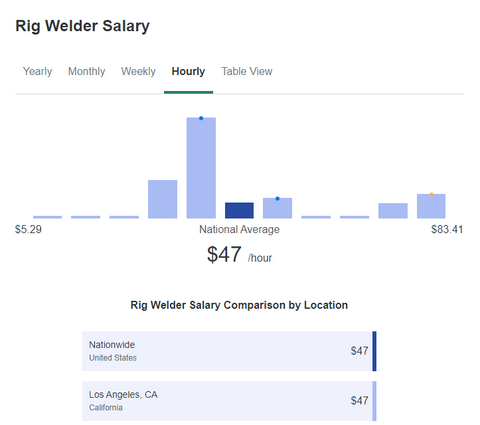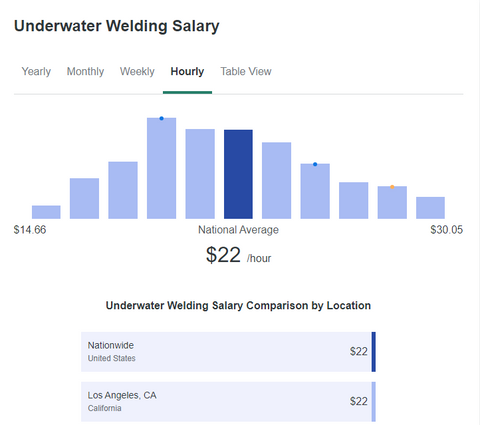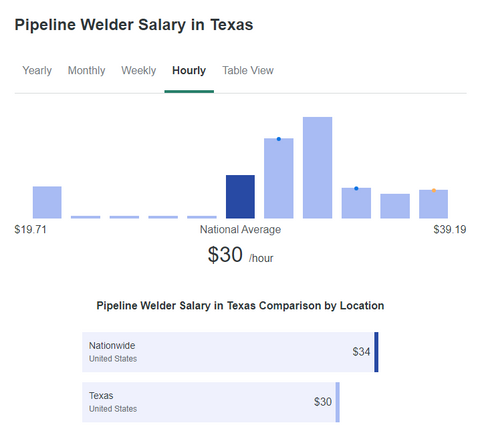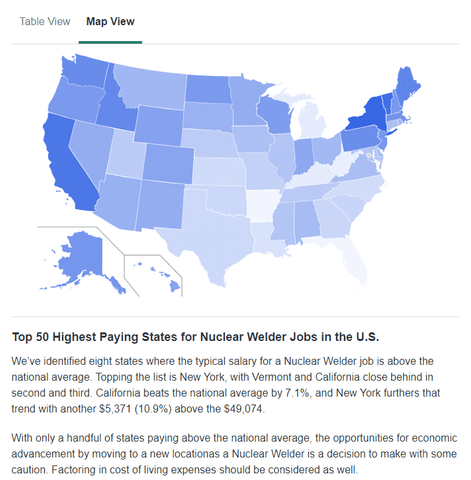How Much Do Welders Earn? Exploring the Rewarding Challenges of a Welding Career
Jan 10, 2024
Welding, a skilled craft and an essential trade, is integral to various production techniques and industries. It's a career path that combines technical skills with the artistry of joining metals. As we delve into the world of welding, we aim to provide a comprehensive understanding of what welders earn, the factors influencing their income, and the challenges and rewards of this career. This article will guide those considering welding as a profession, offering insights into its financial and professional aspects.
The Welding Profession: A Brief Overview
Welding is much more than just a technical skill; it's a craft that has been shaping our world for centuries. This profession, home to over 3 million practitioners in the United States alone, is a fusion of art and science. Welders master the art of heating and fusing metals, a process that requires not only a steady hand and sharp eye but also an in-depth understanding of metal properties and behavior under extreme temperatures.
Diverse Techniques and Specializations
Welding encompasses a range of techniques, each suited to different materials and applications. From the precision of Tungsten Inert Gas (TIG) welding to the versatility of Metal Inert Gas (MIG) welding and the ruggedness of Stick welding, each method offers unique benefits. Advanced techniques like underwater welding and aerospace welding push the boundaries of the profession, demanding specialized skills and training.
Key Roles in Vital Industries
Welders are the backbone of numerous industries.
In construction, they are responsible for creating the skeletal frames of buildings and bridges, ensuring the strength and integrity of these structures.
In the manufacturing sector, welders play a crucial role in producing everything from automobiles to household appliances, contributing to both the functionality and aesthetics of these products.
In aerospace, welders take on the critical task of fabricating parts for aircraft and spacecraft. Their work in this domain requires exceptional precision, as the components they create must withstand extreme conditions and meet stringent safety standards.
This level of precision and quality is also essential in other high-stakes areas like pipeline welding, where the safety and efficiency of energy transportation rely on the welder's expertise.
A Career of Continuous Learning and Adaptation
Welding is a profession that demands lifelong learning. As technologies evolve, so do the tools and techniques used in welding. Staying abreast of these advancements is crucial for any welder looking to remain competitive in the field. This continuous learning curve opens doors to new opportunities and specialties, allowing welders to carve out niche roles and become experts in specific areas of the trade.
The Artistic Side of Welding
Beyond its industrial applications, welding has an artistic side as well. Many welders channel their skills into creating sculptures and bespoke metal artworks. This creative outlet showcases the versatility of welding as a skill and highlights the welder's role as an artist who can transform metal into expressive and intricate forms.
Environmental and Safety Considerations
Modern welding also encompasses an increasing focus on environmental and safety issues. Welders are trained to work with a deep understanding of the health and safety standards required in their field, ensuring both their well-being and that of their co-workers. Additionally, with a growing emphasis on sustainable practices, welders are often at the forefront of implementing environmentally friendly techniques in their work.
Income Statistics for Welders

Average Earnings
As of 2024, the average salary for welders in the U.S. is estimated at around $41,710 per year. However, this figure varies based on several factors including experience, location, industry, and level of expertise. Welders typically earn about $18.75 per hour, translating to an average weekly wage of $810.
Impact of Experience
Welding income significantly correlates with experience. Entry-level welders can expect to earn over $28,000 annually, while mid-career professionals see their income start from $37,520. Seasoned welders with extensive experience can earn between $60,000 to $75,000 annually, and those with over 30 years in the field can make up to $100,000.
Top-Paying Welding Jobs
Specialized welding roles command higher pay rates. For instance:
Rig Welders: Average $47 per hour.

Underwater Welders: Average $22 per hour.

Pipe Welders: Average $34 per hour.

Nuclear Welders: Average $32 per hour.

Regional and Industry Variations
Welders in large cities and industrial areas typically earn more than those in rural settings. Industries like aerospace and construction offer higher wages compared to smaller manufacturing firms. Union membership also tends to result in higher earnings.
Challenges and Rewards of a Welding Career

The Physical and Mental Demands
Welding is a physically demanding job that requires precision, endurance, and attention to detail. Working in extreme conditions, handling heavy equipment, and sometimes performing high-risk tasks (like underwater welding) are part of the job's challenges.
However, these challenges bring a sense of accomplishment and pride in one's work, especially when contributing to significant projects like building bridges or crafting aerospace components.
Career Growth and Development
The welding industry offers diverse career paths. From hands-on welding positions to roles in project management, supervision, or inspection, there are opportunities for growth and specialization. Continual learning through certifications and training can lead to higher-paying positions and new career avenues.
Job Security and Demand
Welding is expected to see a faster-than-average job growth, with a 13% increase in demand projected up to 2026. This growth, driven by the need for skilled welders in various industries, ensures job security. Additionally, about 40% of welders are self-employed, providing flexibility and entrepreneurial opportunities.
Is Welding the Right Career for You?
Choosing a career in welding means embracing both its challenges and rewards. It's a profession that requires skill, dedication, and a willingness to continually learn and adapt. The financial prospects are promising, especially with experience and specialization. If you have a penchant for hands-on work, enjoy technical challenges, and seek a career with diverse opportunities, welding could be an excellent choice.
Welding offers a fulfilling career path with competitive earnings, especially for those who are committed to honing their craft and advancing their skills. As industries evolve and the demand for skilled welders grows, this career path shines as a beacon of opportunity and financial stability.
If you want to do your job well, you must first sharpen your tools. If you want to truly pursue what you love, then you must first own your own first welding machine. Whether you are a novice or a professional welder, no matter you are familiar with welding machines. If you have any hard-core requirements, SD-4050Pro and Upgraded SD-4050Pro[2024] can satisfy you. The powerful 10-in-1 machine [Pulse MIG/HF TIG/Pulse TIG/Pilot Arc Plasma Cutting/Stick......]allows you to get twice the result with half the effort when working. You can also enjoy automatic discounts and free screwdriver tool kit if you buy it now.





1 commentaire
If I advertise your welders at my shop and my social media accounts can I get the SD 4050pro free you can sponsor me and my fab shop “Make Shxt Happen fabrications” and me and the guys will make video’s and take photos using your welders exclusively.